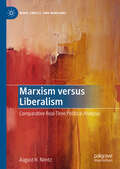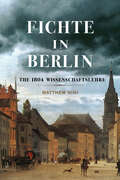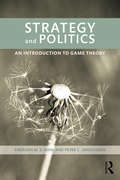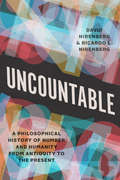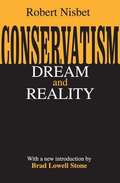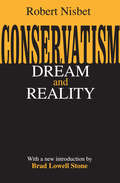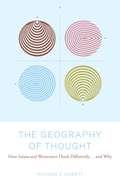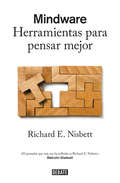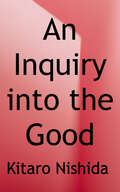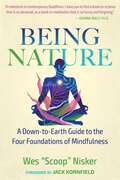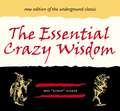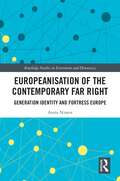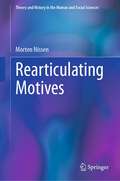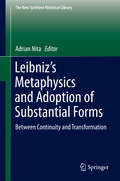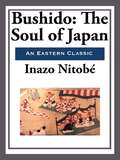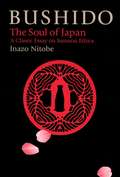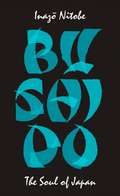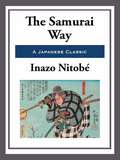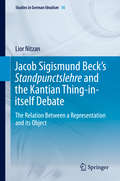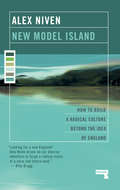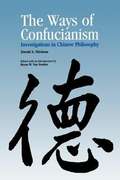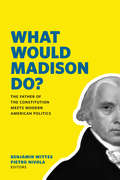- Table View
- List View
Marxism versus Liberalism: Comparative Real-Time Political Analysis (Marx, Engels, and Marxisms)
by August H. Nimtz“An extraordinary work of political historical analysis that methodically and convincingly argues for the superiority of a Marxist approach for pursuing democracy. Rich in historical detail and thoroughly engrossing in portraying the real-time analyses of and intervention in crucial events by prominent Marxist and liberal theorists and political actors, Marxism versus Liberalism is a truly impressive achievement that will have an enduring appeal.” —John F. Sitton, Professor Emeritus, Political Science, Indiana University of Pennsylvania, USAPerforming a comparative real-time political analysis, Marxism versus Liberalism presents convincing evidence to sustain two similarly audacious claims: firstly, that Karl Marx and Frederick Engels collectively had better democratic credentials than Alexis de Tocqueville and John Stuart Mill; and secondly, that Vladimir Lenin had better democratic credentials than Max Weber and Woodrow Wilson. When the two sets of protagonists are compared and contrasted in how they read and responded to big political events in motion, this book contends that these Marxists proved to be better democrats than the history’s most prominent Liberals. Exploring the historical scenarios of The European Spring of 1848, the United States Civil War, the 1905 Russian Revolution, the 1917 Russian Revolution, and the end of World War I, Marxism versus Liberalism carefully tests each claim in order to challenge assumed political wisdom.
Fichte in Berlin: The 1804 Wissenschaftslehre (McGill-Queen’s Philosophy of Religion Series #1)
by Matthew NiniWhen the celebrated German philosopher Johann Gottlieb Fichte lost his position at the University of Jena and moved to Berlin, it looked as if his career was over. In 1799 Berlin had no university, and Fichte was consigned to lecturing in his home.In Fichte in Berlin Matthew Nini breaks with scholarly consensus, arguing it was there that Fichte finally reached maturity, and the only way to understand Fichte’s mature philosophy is to perform it for oneself. The book focuses on the philosopher’s 1804 lectures on the Wissenschaftslehre – an untranslatable neologism for his theories on the pursuit of insight – claiming that they are one of the most exemplary versions of the philosophical project that Fichte reconfigured some seventeen times throughout his life. While the 1804 lectures offer a more robust approach, they remain faithful to the insight at the heart of the original philosophy. Fichte’s work always emphasized the practical over the theoretical, and his 1804 work goes even further: to think with Fichte is to bring one’s own philosophy to life. Nini guides the reader step by step through the complex arguments Fichte made in 1804 and goes on to examine some of his other works produced in their wake, arguing that Fichte’s output from 1804 to 1806, his first Berlin period, forms an organic whole.Fichte in Berlin is not only an introduction to Fichte’s later philosophy, but also an original philosophical work that makes a unique contribution to the study of German Idealism.
Strategy and Politics: An Introduction to Game Theory
by Emerson Niou Peter C. OrdeshookStrategy and Politics: An Introduction to Game Theory is designed to introduce students with no background in formal theory to the application of game theory to modeling political processes. This accessible text covers the essential aspects of game theory while keeping the reader constantly in touch with why political science as a whole would benefit from considering this method. Examining the very phenomena that power political machineries—elections, legislative and committee processes, and international conflict, the book attempts to answer fundamental questions about their nature and function in a clear, accessible manner. Included at the end of each chapter is a set of exercises designed to allow students to practice the construction and analysis of political models. Although the text assumes only an elementary-level training in algebra, students who complete a course around this text will be equipped to read nearly all of the professional literature that makes use of game theoretic analysis.
Uncountable: A Philosophical History of Number and Humanity from Antiquity to the Present
by David Nirenberg Ricardo L. NirenbergRanging from math to literature to philosophy, Uncountable explains how numbers triumphed as the basis of knowledge—and compromise our sense of humanity. Our knowledge of mathematics has structured much of what we think we know about ourselves as individuals and communities, shaping our psychologies, sociologies, and economies. In pursuit of a more predictable and more controllable cosmos, we have extended mathematical insights and methods to more and more aspects of the world. Today those powers are greater than ever, as computation is applied to virtually every aspect of human activity. Yet, in the process, are we losing sight of the human? When we apply mathematics so broadly, what do we gain and what do we lose, and at what risk to humanity? These are the questions that David and Ricardo L. Nirenberg ask in Uncountable, a provocative account of how numerical relations became the cornerstone of human claims to knowledge, truth, and certainty. There is a limit to these number-based claims, they argue, which they set out to explore. The Nirenbergs, father and son, bring together their backgrounds in math, history, literature, religion, and philosophy, interweaving scientific experiments with readings of poems, setting crises in mathematics alongside world wars, and putting medieval Muslim and Buddhist philosophers in conversation with Einstein, Schrödinger, and other giants of modern physics. The result is a powerful lesson in what counts as knowledge and its deepest implications for how we live our lives.
Uncountable: A Philosophical History of Number and Humanity from Antiquity to the Present
by David Nirenberg Ricardo L. NirenbergRanging from math to literature to philosophy, Uncountable explains how numbers triumphed as the basis of knowledge—and compromise our sense of humanity. Our knowledge of mathematics has structured much of what we think we know about ourselves as individuals and communities, shaping our psychologies, sociologies, and economies. In pursuit of a more predictable and more controllable cosmos, we have extended mathematical insights and methods to more and more aspects of the world. Today those powers are greater than ever, as computation is applied to virtually every aspect of human activity. Yet, in the process, are we losing sight of the human? When we apply mathematics so broadly, what do we gain and what do we lose, and at what risk to humanity? These are the questions that David and Ricardo L. Nirenberg ask in Uncountable, a provocative account of how numerical relations became the cornerstone of human claims to knowledge, truth, and certainty. There is a limit to these number-based claims, they argue, which they set out to explore. The Nirenbergs, father and son, bring together their backgrounds in math, history, literature, religion, and philosophy, interweaving scientific experiments with readings of poems, setting crises in mathematics alongside world wars, and putting medieval Muslim and Buddhist philosophers in conversation with Einstein, Schrödinger, and other giants of modern physics. The result is a powerful lesson in what counts as knowledge and its deepest implications for how we live our lives.
Conservatism: Dream and Reality
by Robert NisbetThe essential concerns of conservatism are the same as those that motivated Nisbet's first and most influential book, The Quest for Community. In fact, Conservatism unites virtually all of Nisbet's work. In it, Nisbet deals with the political causes of the manifold forms of alienation that underwrite the human quest for community. The sovereign political state is more than a legal relationship of a superstructure of power, it is inseparable from its successive penetrations of man's economic, religious, kinship and local allegiances, and its revolutionary dislocations of established centers of power. Nisbet holds that although political philosophers are often conceived in terms of their views of the individual and the state, a more useful approach adds the factor of social groups or communities mediating between the individual and the state. Such groups comprise "society" the protection of which is the "sole object" of the conservative tradition, according to Nisbet. This conservative ideology arose in the West as a reaction to the French Revolution and its perceived impact upon traditional society. Edmund Burke was the first spokesman of the new ideology. In this book, Nisbet argues that modern conservatism throughout the West can be seen as a widening of Burke's indictment not only of the French Revolution, but of the larger revolution we have come to call modernity. From Edmund Burke and his contemporaries such as Bonald, de Maistre, Haller, and Savigny, down to T. S. Eliot, Christopher Dawson, Michael Oakeshott, Irving Babbit, Paul Elmer More, and Russell Kirk, the essential themes of political conservatism remained the same. They are centered upon history, tradition, property, authority, liberty and religion, and attack equally the political collectivism and radical individualism that have the same irrational outcomes. Nisbet makes the point that, at present, conservatism is also in a crisis, one created in large measure by mixing in the political arena economic liberalism and welfare state socialism - a lethal mix for conservative politics.
Conservatism: Dream and Reality (Concepts In Social Sciences Ser.)
by Robert NisbetThe essential concerns of conservatism are the same as those that motivated Nisbet's first and most influential book. The Quest for Community. In fact, Conservatism unites virtually all of Nisbet's work. In it, Nisbet deals with the political causes of the manifold forms of alienation that underwrite the human quest for community. The sovereign political state is more than a legal relationship of a superstructure of power, it is inseparable from its successive penetrations of man's economic, religious, kinship and local allegiances, and its revolutionary dislocations of established centers of power. Nisbet holds that although political philosophers are often conceived in terms of their views of the individual and the state, a more useful approach adds the factor of social groups or communities mediating between the individual and the state. Such groups comprise "society" the protection of which is the "sole object" of the conservative tradition, according to Nisbet. This conservative ideology arose in the West as a reaction to the French Revolution and its perceived impact upon traditional society. Edmund Burke was the first spokesman of the new ideology. In this book, Nisbet argues that modern conservatism throughout the West can be seen as a widening of Burke's indictment not only of the French Revolution, but of the larger revolution we have come to call modernity. From Edmund Burke and his contemporaries such as Bonald, de Maistre, Haller, and Savigny, down to T.S. Eliot, Christopher Dawson, Michael Oakeshott, Irving Babbit, Paul Elmer More, and Russell Kirk, the essential themes of political conservatism remained the same. They are centered upon history, tradition, property, authority, liberty and religion, and attack equally the political collectivism and radical individualism that have the same irrational outcomes. Nisbet makes the point that, at present, conservatism is also in a crisis, one created in large measure by mixing in the political arena economic liberalism and welfare state socialism - a lethal mix for conservative politics.
The Quest for Community: A Study in the Ethics of Order and Freedom
by Robert Nisbet"The Quest for Community" stands among the most important social critiques ever written. The first book by the man the New York Times calls "one of our most original social thinkers", Robert Nisbet's study explores how individualism and statism have flourished while the primary sources of human community - the family, neighborhoods, the church, and voluntary organizations - have grown weaker. First published in 1953, this timeless work is a seminal contribution to the understanding of the spiritual and intellectual crisis of Western Society. With a new introduction by William A. Schambra that places the book in a contemporary perspective, "Quest for Community" deserves to be reread in the light of events that have confirmed its provocative thesis.
The Geography of Thought
by Richard NisbettEveryone knows that while different cultures may think about the world differently, they use the same equipment for doing their thinking. Everyone knows that whatever the skin color, nationality, or religion, every human being uses the same tools for perception, for memory, and for reasoning. Everyone knows that a logically true statement is true in English, German, or Hindi. Everyone knows that when a Chinese and an American look at the same painting, they see the same painting.But what if everyone is wrong?When psychologist Richard E. Nisbett showed an animated underwater scene to his American students, they zeroed in on a big fish swimming among smaller fish. Japanese subjects, on the other hand, made observations about the background environment -- and the different "seeings" are a clue to profound underlying cognitive differences between Westerners and East Asians. For, as Professor Nisbett shows in The Geography of Thought, people actually think about -- and even see -- the world differently because of differing ecologies, social structures, philosophies, and educational systems that date back to ancient Greece and China and that have survived into the modern world. As a result, East Asian thought is "holistic" -- drawn to the perceptual field as a whole and to relations among objects and events within that field. By comparison to Western modes of reasoning, East Asian thought relies far less on categories or on formal logic; it is fundamentally dialectic, seeking a "middle way" between opposing thoughts. By contrast, Westerners focus on salient objects or people, use attributes to assign them to catergories, and apply rules of formal logic to understand their behavior. The Geography of Thought documents Professor Nisbett's groundbreaking international research in cultural psychology, a series of comparative studies both persuasive in their rigor and startling in their conclusions, addressing questions such as: Why did the ancient Chinese excel at algebra and arithmetic, but not geometry, the brilliant achievement of such Greeks as Euclid? Why do East Asians find it so difficult to disentangle an object from its surroundings? Why do Western infants learn nouns more rapidly than verbs, when it is the other way around in East Asia? What are the implications of these cognitive differences for the future of international politics? Do they support a Fukuyamaesque "end of history" scenario or a Huntingtonian "clash of civilizations"?From feng shui to metaphysics, from comparative linguistics to economic history, a gulf separates the children of Aristotle from the descendants of Confucius. At a moment in history when the need for cross-cultural understanding and collaboration have never been more important, The Geography of Thought offers both a map to that gulf and a blueprint for a bridge that might be able to span it.
The Geography of Thought: How Asians and Westerners Think Differently... and Why
by Richard E. NisbettWhen psychologist Richard E. Nisbett showed an animated underwater scene to his American students, they zeroed in on a big fish swimming among smaller fish. Japanese observers instead commented on the background environment -- and the different "seeings" are a clue to profound cognitive differences between Westerners and East Asians. As Nisbett shows in The Geography of Thought, people think about -- and even see -- the world differently because of differing ecologies, social structures, philosophies, and educational systems that date back to ancient Greece and China. The Geography of Thought documents Professor Nisbett's groundbreaking research in cultural psychology, addressing questions such as: Why did the ancient Chinese excel at algebra and arithmetic, but not geometry, the brilliant achievement of such Greeks as Euclid? Why do East Asians find it so difficult to disentangle an object from its surroundings? Why do Western infants learn nouns more rapidly than verbs, when it is the other way around in East Asia? At a moment in history when the need for cross-cultural understanding and collaboration have never been more important, The Geography of Thought offers both a map to that gulf and a blueprint for a bridge that might be able to span it.
Mindware: Herramientas para pensar mejor
by Richard E. NisbettUn libro revelador que nos enseña a analizar problemas cotidianos aplicando las herramientas científicas más útiles para tomar mejores decisiones profesionales, empresariales y personales. Hay conceptos científicos y lógicos que cambian el modo en que solucionamos problemas cotidianos al ayudarnos a pensar de modo más claro acerca del mundo y de nuestras acciones. Sorprendentemente, pese a su utilidad, muchas de estas herramientas permanecen olvidadas por la mayoría de nosotros. En Mindware, el eminente psicólogo Richard E. Nisbett expone estos conceptos de manera clara y accesible. La distinguida carrera de Nisbett ha consistido en el estudio y la difusión de ideas tan potentes para resolver situaciones como la ley de los grandes números, regresiones estadísticas, análisis de coste y beneficio, costes de oportunidad y costes hundidos, o la causalidad y la correlación, en busca de la mejor manera de lograr que los demás los usen eficazmente en su día a día. En este libro, Nisbett nos enseña a analizar problemas habituales de manera que estos principios científicos y estadísticos sean aplicables. El resultado es una guía tan práctica como iluminadora a las herramientas de pensamiento más importantes; herramientas que se pueden emplear de modo inmediato para tomar mejores decisiones profesionales, empresariales y personales. Críticas:«El pensador que más me ha influido es el psicólogo Richard Nisbett. A él le debo mi visión del mundo.»Malcolm Gladwell «Mindware nos ofrece la oportunidad de comprender y reaccionar de modo más inteligente al caótico mundo que nos rodea.»Leonard Mlodinow, The New Yor Times Book Review
An Inquiry into the Good
by Kitaro NishidaThis book represented the foundation of Nishida's philosophy--reflecting both his deep study of Zen Buddhism and his thorough analysis of Western philosophy--and established its author as the foremost Japanese philosopher of this century. <p><p>In this important new translation, two scholars--one Japanese and one American--have worked together to present a lucid and accurate rendition of Nishida's ideas.
Being Nature: A Down-to-Earth Guide to the Four Foundations of Mindfulness
by Wes Nisker• Provides a practical program, complete with enjoyable, even playful meditations, for realizing greater self-awareness, increased wisdom, and happiness• Shows how recent discoveries in physics, evolutionary biology, and psychology express in scientific terms the same insights the Buddha discovered more than 2,500 years ago• Reveals the origins of attachments, desires, emotions, and thoughts in our own bodiesTaking us on an evolutionary journey to find the origins of emotions, desires, and thoughts in our own bodies, Wes &“Scoop&” Nisker shows not only how cutting-edge science is proving the tenets of the Buddha but also how we can interpret the traditional practices of Buddhism through this scientific lens for more personal freedom and peace of mind. Using the traditional Buddhist meditation series of the Four Foundations of Mindfulness as a framework, Nisker offers a witty narrative along with practical meditations and exercises to train the mind to overcome painful conditioning and gain greater self-awareness, increased wisdom, and happiness. He shows how recent discoveries in physics, evolutionary biology, and psychology express in scientific terms the same insights the Buddha discovered more than 2,500 years ago, such as the impermanence of the body, where thoughts come from, and how the body communicates within itself. Presenting a variety of new ways to harness the power of mindfulness to transform our understanding of both ourselves and the world, Nisker teaches us how to put our understanding of evolution in the service of spiritual awakening.
The Essential Crazy Wisdom
by Wes NiskerTake a wild and rickety ride through the philosophies of the East and West to discover the madmen, dreamers, and unconventional wisdom seekers in the abridged, better-than-ever version of our best-selling cult classic. THE ESSENTIAL CRAZY WISDOM delivers the most significant, most lunatic, and most compelling insights of the ages. Scoop Nisker patches together the unorthodox teachings that have bubbled up through the words of such crazy visionaries as Rumi, Gautama the Buddha, Mark Twain, Lao Tzu, Albert Einstein, Mahatma Gandhi, Allen Ginsberg, and Lily Tomlin. Discover the common thread in these multiple perspectives and travel on this comedic course to enlightenment! Ģ Original edition sold over 40,000 copies.
Europeanisation of the Contemporary Far Right: Generation Identity and Fortress Europe (Routledge Studies in Extremism and Democracy)
by Anita NissenEuropeanisation of the Contemporary Far Right explores the role of transnational European identity in far-right mobilisation strategies. Focusing on the national members of two trans-European far-right coalitions – Generation Identity and Fortress Europe – the author explores the extent to which European far-right extra-parliamentary actors Europeanise their mobilisation. Drawing on social movement literature, the book argues that national extra-parliamentary actors’ Europeanisation processes are influenced by their political and discursive opportunities and resources. Focusing on the groups’ mobilisation during the ‘refugee crisis’ (2015–2017), the analysis considers the groups’ frames, collective action, and coalition-building in the period, finding that the depth of the groups’ resources particularly affects their capacity to mobilise. This book will be of interest to scholars, students, and civil society actors in fields related to the far right, European studies, social movements, and migration.
Rearticulating Motives (Theory and History in the Human and Social Sciences)
by Morten NissenThis book presents a theory of motives that has evolved over decades in dialogue with academics and with practitioners. The key proposal is that of collectively cultivating meta-motives – rather than the ubiquitous recipes for manipulating self-regulation. Cultivating meta-motives can proceed through rearticulating motives. Such rearticulation engages with theories and practices of motivation and motives. First, this is a discussion of the psychologies of motivation, and a reflection of post-psychology as a way forward. Second, this discussion takes us back to fundamental problems with subjectivity, and with psychology, even critical psychology, as a way of addressing it. Third, out of this theoretical work come concepts that are put to work in understanding practices of modelling and cultivating motives – clinical, social work, and educational practices. In the first instance, as a critique of contemporary pragmatic practices, and then by rearticulating aesthetic practices as ways to expand and overcome those. Fourth, this has implications for the cultivation of the competence in care for motives, and for the place of theory in this competence. The book provides both a theoretical argument and a resource for those professionals in education, social work, and health who seek a qualitative understanding of what they do.
Leibniz's Metaphysics and Adoption of Substantial Forms
by Adrian NitaThis anthology is about the signal change in Leibniz's metaphysics with his explicit adoption of substantial forms in 1678-79. This change can either be seen as a moment of discontinuity with his metaphysics of maturity or as a moment of continuity, such as a passage to the metaphysics from his last years. Between the end of his sejour at Paris (November 1676) and the first part of the Hanover period, Leibniz reformed his dynamics and began to use the theory of corporeal substance. This book explores a very important part of the philosophical work of the young Leibniz. Expertise from around the globe is collated here, including Daniel Garber's work based on the recent publication of Leibniz's correspondence from the late 1690s, examining how the theory of monads developed during these crucial years. Richard Arthur argues that the introduction of substantial forms, reinterpreted as enduring primitive forces of action in each corporeal substance, allows Leibniz to found the reality of the phenomena of motion in force and thus avoid reducing motion to a mere appearance. Amongst other themes covered in this book, Pauline Phemister's paper investigates Leibniz's views on animals and plants, highlighting changes, modifications and elaborations over time of Leibniz's views and supporting arguments and paying particular attention to his claim that the future is already contained in the seeds of living things. The editor, Adrian Nita, contributes a paper on the continuity or discontinuity of Leibniz's work on the question of the unity and identity of substance from the perspective of the relation with soul (anima) and mind (mens).
Bushido: The Soul of Japan
by Inazo NitobeChivalry is a flower no less indigenous to the soil of Japan than its emblem, the cherry blossom; nor is it a dried-up specimen of an antique virtue preserved in the herbarium of our history. It is still a living object of power and beauty among us; and if it assumes no tangible shape or form, it not the less scents the moral atmosphere, and makes us aware that we are still under its potent spell. The conditions of society which brought it forth and nourished it have long disappeared; but as those far-off stars which once were and are not, still continue to shed their rays upon us, so the light of chivalry, which was a child of feudalism, still illuminates our moral path, surviving its mother institution. It is a pleasure to me to reflect upon this subject in the language of Burke, who uttered the well-known touching eulogy over the neglected bier of its European prototype.
Bushido: The Soul of Japan
by Inazo NitobeA century ago, when Japan was transforming itself from an isolated feudal society into a modern nation, a Japanese educator queried about the ethos of his people composed this seminal work, which with his numerous other writings in English made him the best, known Japanese writer in the West during his lifetime.He found in Bushido, the Way of the Warrior, the sources of the virtues most admired by his people: rectitude, courage, benevolence, politeness, sincerity, honor, loyalty and self-control. His approach to his task was eclectic and far-reaching. On the one hand, he delved into the indigenous traditions, into Buddhism, Shintoism, Confucianism and the moral guidelines handed down over hundreds of years by Japan's samurai and sages. On the other hand, he sought similarities and contrasts by citing not only Western philosophers and statesmen, but also the shapers of European and American thought and civilization going back to the Romans, the Greeks and Biblical times.This book is a classic to which generations of scholars and laymen alike have long referred for insights into the character of the Japanese people. And all of its many readers in the past have been amply rewarded, as will be all those who turn to its pages in the next and future decades.
Bushido: The Soul of Japan (Penguin Great Ideas)
by Inazo Nitobe'What Japan was she owed to the samurai. They were not only the flower of the nation, but its root as well.'Inazo Nitobe's book, the most influential ever written on Bushido, or the samurai Way of the Warrior, argues that the philosophy of Bushido is the true key to understanding 'the soul of Japan'.One of twenty new books in the bestselling Penguin Great Ideas series. This new selection showcases a diverse list of thinkers who have helped shape our world today, from anarchists to stoics, feminists to prophets, satirists to Zen Buddhists.
The Samurai Way
by Inazo NitobeCollected here in one edition are two of the most important books on the Samurai Way, Bushido: The Soul of Japan and The Book of Five Rings. Bushido: Chivalry is a flower no less indigenous to the soil of Japan than its emblem, the cherry blossom; nor is it a dried-up specimen of an antique virtue preserved in the herbarium of our history. It is still a living object of power and beauty among us. The Book of Five Rings: There are various Ways. There is the Way of salvation by the law of Buddha, the Way of Confucius governing the Way of learning, the Way of healing as a doctor, as a poet teaching the Way of Waka, tea, archery, and many arts and skills. Generally speaking, the Way of the warrior is resolute acceptance of death.
Jacob Sigismund Beck's Standpunctslehre and the Kantian Thing-in-itself Debate
by Lior NitzanThis book examines the unique views of philosopher Jacob Sigismund Beck, a student of Immanuel Kant who devoted himself to an exploration of his teacher's doctrine and to showing that Kant's transcendental idealism is, contra to the common view, both internally consistent and is not a form of subjective idealism. In his attempt to explain away certain apparent contradictions found in Kant's system, Beck put forward a new reading of Kant's critical theory, a view, which came to be known as the Standpunctslehre, the Doctrine of the Standpoint. Author Lior Nitzan reconstructs, step by step, the historical development of Beck's doctrine. He shows how Beck's unique view is drastically different from that of his contemporaries and presents the relevance of Beck to contemporary debates about the proper interpretation of Kant's notion of objectivity, the refutation of idealism and the role of the thing in itself in Kant's transcendental idealism. In doing so, Nitzan presents a defense of Beck's radical perspective of Kant's theory and claims that some of Kant's negative responses to it may in fact be due more to the adversary academic environment at the time than to Kant's true, well considered, opinion. Jacob Sigismund Beck's Standpunctslehre challenges the two dominant schools in the interpretation of Kant's transcendental idealism--the "two world" and the "two aspect" view. It presents a new way of understanding Kant's transcendental idealism, according to which the thing in itself plays no positive role in relation to the possibility of experience. Moreover, it claims that eliminating the thing in itself as the ultimate object of knowledge is not to admit idealism but in fact is the only way to consistently uphold realism. In addition, the book also addresses the question why, assuming that the proposed interpretation is correct, Kant had chosen not to make his true intentions clear.
New Model Island: How to Build a Radical Culture Beyond the Idea of England
by Alex NivenA study of place, identity, music, politics and regionalism which calls for a radical restructuring of the British Isles.In the early twenty-first century, "Englishness" suddenly became a hot topic. A rash of art exhibitions, pop albums and coffee table books arrived on the scene, all desperate to recover England&’s lost national soul. But when we sweep away the patriotic stereotypes, we begin to see that England is a country that does not — and perhaps should not — exist in any essential sense.In this provocative text combining polemic and memoir, Alex Niven argues that the map of the British Isles should be torn apart completely as we look towards a time of radical political reform. Rejecting outdated nationalisms, Niven argues for a renovated model of culture and governance for the islands — a fluid, dynamic version of regionalism preparing the way for a new "dream archipelago".
The Ways Of Confucianism: Investigations In Chinese Philosophy
by David S. Nivison Bryan Van Norden<P>The study of Chinese philosophy requires an unusual combination of talents.<P> First, one must be a philosopher at heart (if not of academic department), for the issues that Mencius, Zhuāngzĭ [Chinese text removed], Zhū Xī [Chinese text removed] Wang Yángmíng [Chinese text removed], and other Chinese thinkers address are living philosophic issues. <P>Just as it took someone with a genuine understanding of science--Joseph Needham--to first appreciate Chinese science, so it takes a genuine philosopher to fully engage Chinese philosophy.<P> Second, one must be a Sinologist, for even modern Chinese are separated by wide linguistic and cultural barriers from their predecessors.<P> And to study Chinese philosophy without the tools to overcome those barriers is merely to project one's own preoccupations and concerns onto an alien culture, thereby robbing oneself of the opportunity for a genuine "fusing of horizons." Among the generation of scholars who came to intellectual maturity following the second world war, several stand out for their knowledge of both philosophy and Sinology. Among these are A. C. Graham, D.C. Lau, Donald Munro, and David S. Nivison.<P> Of these four, Nivison's work is the least well known. Although highly respected in Sinological circles and among us "happy few" who study Chinese philosophy, Nivison has remained a philosopher's philosopher, and his work is not commonly cited.<P> Consider two outstanding recent histories of ancient Chinese philosophy--Benjamin Schwartz's The World of Thought in Ancient China (1985) and A. C. Graham's Disputers of the Too (1989). Schwartz cites only two papers by Nivison--one dating the conquest of the Shang by the Zhou (1983), and one a highly technical bit of philology analyzing Shang Dynasty oracle bone inscriptions (1978-1979). Graham, on the other hand, cites three articles by Nivison, only one of which is on philosophy (1980a), the other two essays dealing with chronological issues (1982-1983,1983).
What Would Madison Do?
by Pietro S Nivola Benjamin WittesWhat would the father of the Constitution think of contemporary developments in American politics and public policy?Constitutional scholars have long debated whether the American political system, which was so influenced by the thinking of James Madison, has in fact grown outmoded. But if Madison himself could peer at the present, what would he think of the state of key political institutions that he helped originate and the government policies that these institutions produce? In What Would Madison Do?, ten prominent scholars explore the contemporary performance of Madison's constitutional legacy and how much would have surprised him.John DiIulio Jr. (University of Pennsylvania) observes the failure of today's policymakers to address adequately the nation' s long-range financial liabilities.William Galston (Brookings Institution) examines the implications of the rise of political parties and the ascent of "direct versus representative democracy."Pietro Nivola (Brookings Institution) makes the case that the American political system actually acquitted itself comparatively well in contending with the recent Great Recession.R. Shep Melnick (Boston College) challenges the common presumption that the U.S. government is gridlocked.Jonathan Rauch (Brookings Institution) argues that America's political process continues to encourage useful compromise, much as Madison intended.Jack Rakove (Stanford University) ponders what Madison would think of the contemporary U.S. Senate.Martha Derthick (University of Virginia) contemplates the current federal government's extensive involvement in the concerns of states and localities.Eugene Hickok (former deputy secretary of education) discusses Madison's devotion to education and invites us to wonder how he might view the educational system's current condition.Lynn Uzzell (Robert H. Smith Center for the Constitution at James Madison's Montpelier) reflects on how Madison might have regarded the judicial role in resolving constitutional disputes such as those stirred by laws such as the Affordable Care Act.Benjamin Wittes (Brookings Institution) and Ritika Singh (Lawfare) look at the age-old tension between national security interests and safeguarding civil liberties.
